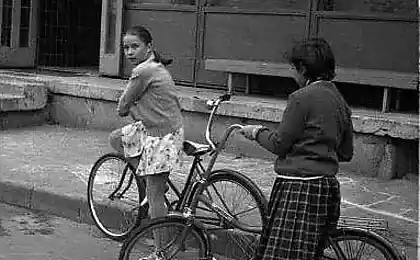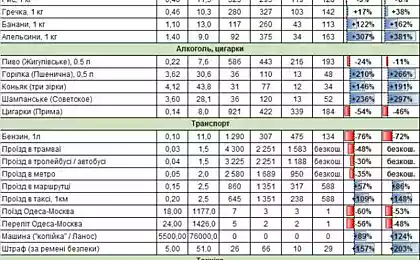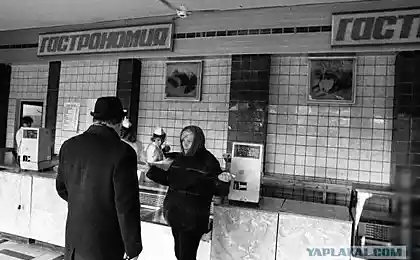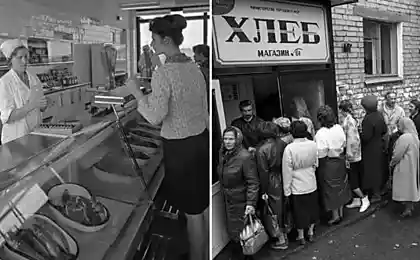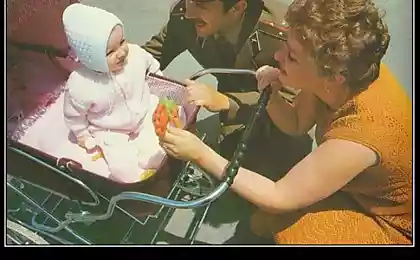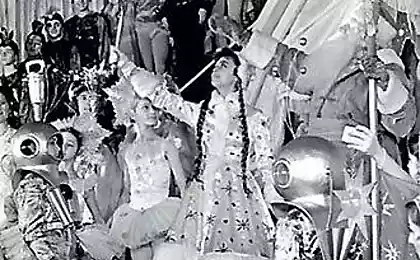189
Was it possible to live on Soviet wages and how people generally coped
Who lived well in Soviet times? A question that still haunts many. Some people remember the Soviet era as the best time in his life, while others are glad that the Soviet Union collapsed. But the slogan of that time was that all citizens are equal. Why are people’s memories of that era so different? Editorial "Site" I decided to find out what it was like. Soviet salary What a Soviet citizen could afford.

Yes, undoubtedly, everyone’s requests are different and, accordingly, everyone has different requirements for the quality of their life. Someone enough to live in a one-room apartment, go to work by bus and eat simple food. Someone wants to see the world and tries to go to a new country on every vacation. Someone and a week can not live without buying a new thing and all the money earned spends on shopping. In the Soviet Union, people don’t change. Well, let's be clear, the power elite at all times lived an order of magnitude better than ordinary citizens.

But even if we take the average citizen of a large country, we still get a heterogeneous picture. Someone was satisfied with the clothes bought in the store and he had enough. Someone wanted to buy a foreign jean. A lot depends on the place of residence of this citizen. The provision of large cities and small ones in the outback was very different. We have already written about food supply in the Soviet Union. So it turns out that the memories of wealth and fullness of shelves in the store are different for everyone.

But back to the monetary reward of citizens for their labor, sometimes simply inhuman. After all, the heyday of the USSR fell on the era of industrialization - factories and factories grew like mushrooms. There was enough work for everyone, and it was a shame to be unemployed. The average salary of a worker or employee in the early 70s was 122 rubles. At the same time, free lunches were provided in canteens, children were fed free of charge in schools and kindergartens. The taxation system in the USSR was very different from the current one. In total, all taxes did not exceed 13% - it included the pension fund, income and even taxes on roads and much more. The only nuance was a tax on childlessness, which was 6%.

After deducting all taxes, the average citizen had about 100 rubles of income. Here are the memories of bread for 16 kopecks and sausage for 1 ruble 20 kopecks. But according to the salary, such prices for products are quite understandable and commensurate. It was impossible to die of hunger in the USSR. What about the apartment, furniture, car, shoes and clothes? Living space is also less clear. Young specialists were provided with a hostel, then it was possible to stand in line for an apartment. Houses were built quickly and a lot, so apartments were obtained relatively quickly.

The cost of rent with all the amenities of civilization, such as hot and cold water, heat, gas was about 6 rubles per person. But the apartment needed furniture and here often Soviet people faced a problem. First of all, just going to the store and choosing the furniture you want and when you need it is simply unrealistic. Secondly, the cost of sometimes a sleeping set or at least a sofa exceeded the average salary several times. The question is, where is the abundance and fulfillment of the five-year plan in three years? There was no diversity or opportunity in the USSR.

And such a luxury as a TV or vacuum cleaner was sometimes simply an unbearable burden for citizens. It took at least six months to eat bread and water to buy a TV. And if we talk about buying a car, then here you could keep yourself on dry ration for up to 10 years. Good shoes, clothes or a bitch cost not three cents and they had to stand in line or have connections in the store. Voyages to the sea or to children's camps were of course free, but they were also not for everyone and not always. So many could see the treasured sea only after the collapse of the USSR and the lifting of the Iron Curtain.

Instagram lived well or badly under the Soviet regime – to judge, of course, not us. We can only learn lessons and experiences from that time. As in any country and under any government there was something good, and there were obvious excesses. But to say unequivocally that the Soviet salary gave every opportunity - the language is no longer turning.

Yes, undoubtedly, everyone’s requests are different and, accordingly, everyone has different requirements for the quality of their life. Someone enough to live in a one-room apartment, go to work by bus and eat simple food. Someone wants to see the world and tries to go to a new country on every vacation. Someone and a week can not live without buying a new thing and all the money earned spends on shopping. In the Soviet Union, people don’t change. Well, let's be clear, the power elite at all times lived an order of magnitude better than ordinary citizens.

But even if we take the average citizen of a large country, we still get a heterogeneous picture. Someone was satisfied with the clothes bought in the store and he had enough. Someone wanted to buy a foreign jean. A lot depends on the place of residence of this citizen. The provision of large cities and small ones in the outback was very different. We have already written about food supply in the Soviet Union. So it turns out that the memories of wealth and fullness of shelves in the store are different for everyone.

But back to the monetary reward of citizens for their labor, sometimes simply inhuman. After all, the heyday of the USSR fell on the era of industrialization - factories and factories grew like mushrooms. There was enough work for everyone, and it was a shame to be unemployed. The average salary of a worker or employee in the early 70s was 122 rubles. At the same time, free lunches were provided in canteens, children were fed free of charge in schools and kindergartens. The taxation system in the USSR was very different from the current one. In total, all taxes did not exceed 13% - it included the pension fund, income and even taxes on roads and much more. The only nuance was a tax on childlessness, which was 6%.

After deducting all taxes, the average citizen had about 100 rubles of income. Here are the memories of bread for 16 kopecks and sausage for 1 ruble 20 kopecks. But according to the salary, such prices for products are quite understandable and commensurate. It was impossible to die of hunger in the USSR. What about the apartment, furniture, car, shoes and clothes? Living space is also less clear. Young specialists were provided with a hostel, then it was possible to stand in line for an apartment. Houses were built quickly and a lot, so apartments were obtained relatively quickly.

The cost of rent with all the amenities of civilization, such as hot and cold water, heat, gas was about 6 rubles per person. But the apartment needed furniture and here often Soviet people faced a problem. First of all, just going to the store and choosing the furniture you want and when you need it is simply unrealistic. Secondly, the cost of sometimes a sleeping set or at least a sofa exceeded the average salary several times. The question is, where is the abundance and fulfillment of the five-year plan in three years? There was no diversity or opportunity in the USSR.

And such a luxury as a TV or vacuum cleaner was sometimes simply an unbearable burden for citizens. It took at least six months to eat bread and water to buy a TV. And if we talk about buying a car, then here you could keep yourself on dry ration for up to 10 years. Good shoes, clothes or a bitch cost not three cents and they had to stand in line or have connections in the store. Voyages to the sea or to children's camps were of course free, but they were also not for everyone and not always. So many could see the treasured sea only after the collapse of the USSR and the lifting of the Iron Curtain.

Instagram lived well or badly under the Soviet regime – to judge, of course, not us. We can only learn lessons and experiences from that time. As in any country and under any government there was something good, and there were obvious excesses. But to say unequivocally that the Soviet salary gave every opportunity - the language is no longer turning.
Star of the TV series “Charmed” and “Beverly Hills” Shannen Doherty went to heaven
Street toilet will smell if you put this powder in it

